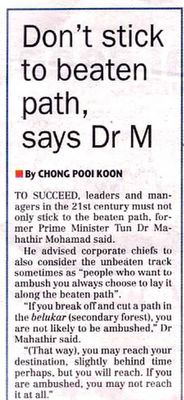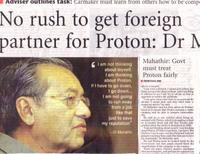Mahathir Theory 

Mahathir has propounded another theory: "The Art of Belukar Management".
According to the theory, "For corporations To SUCCEED, leaders and managers in the 21st century must not stick to the beaten path."
“People who want to ambush you always choose to lay it along the beaten path.”
“If you break off and cut a path in the belukar (secondary forest), you are not likely to be ambushed.
That way, you may reach your destination, slightly behind time perhaps, but you will reach. If you are ambushed, you may not reach it at all.
In essence, Mahathir contention is that, it is better sick and big rather than be healthy and be controlled by others. The fundamental of Belukar Theory lies on the concept of recalcitrant thinking - don't travel on the route others have been taking; be different and be prepared to cut a new path of actions through the deep jungle, instead of travelling on the usual tarmac route. For example, the normal route for organizations that are is in deep financial shit and facing oblition (largely due to it's uncompetitiveness and inefficiencies); the usual route is to restructure by way of consolidation, downsizing, and disposal of assets that are not within your core competence so as to free up your cash flow and reduce debts and to form strategic partnerships thru' merger and acquisition.
 Based on the Belukar Theory, it would mean that you should not take this route but instead drive the company through the belukar (secondary forest), cutting through the bushes and lallangs, and persevered to the destination of your choice.
Based on the Belukar Theory, it would mean that you should not take this route but instead drive the company through the belukar (secondary forest), cutting through the bushes and lallangs, and persevered to the destination of your choice.
Will it work? Maybe, for Mahathir's sake and for UMNO's sake, the government can use Khazanah Holding as a test bed to try the Belukar Theory. Maybe, Permodalan Nasional Berhad can also try it out. Presumably, Mahathir may be sounding out his pointer to Proton to apply this theory.
The Theory was published in conjunction with the Prime Minister Datuk Seri Abdullah Badawi's statement today announcing that the Government is prepared to accept national carmaker Proton Holdings Bhd strategic merger with Volkswagen AG (VW) or other foreign car manufacturers to make it more competitive.
 Abdullah told Bloomberg: “We want the national car to be competitive and we will also allow our national car to develop strategic mergers with bigger automotive companies.”
Abdullah told Bloomberg: “We want the national car to be competitive and we will also allow our national car to develop strategic mergers with bigger automotive companies.”
Abdullah said while the Government was agreeable to selling down a stake in Proton, “the question is what is an appropriate percentage of the equity”.
Abdullah also said that Proton will complete talks this year to develop new car models with VW. Proton would gain a partner with the technology to help stem a five-year sales slump
The Malaysian Government had imposed high taxes and tariffs to avert competition to help Proton survive. Proton needs to improve its quality and find ways to compete with other carmakers as South- East Asia’s trade barriers are removed, Abdullah said.
Proton, which produces eight car designs under its brand, two types of Lotus sports cars and three Agusta motorcycle models, has been seeking a foreign partner since Japan’s Mitsubishi Corp and Mitsubishi Motors Corp ended their 21-year investment in January.
 Proton posted its first loss in six quarters in August, citing surging component costs and higher provisions for doubtful debt. Net loss was RM12.4 million, or 2.2 sen a share, in the three months ended June, compared with last year’s profit of RM166.5 million, or 30.3 sen a share, the company said.
Proton posted its first loss in six quarters in August, citing surging component costs and higher provisions for doubtful debt. Net loss was RM12.4 million, or 2.2 sen a share, in the three months ended June, compared with last year’s profit of RM166.5 million, or 30.3 sen a share, the company said.
Proton’s share of Malaysia’s vehicle market, the second-largest in South-East Asia, fell to 44 per cent last year, from 66 per cent in 1999, losing sales in the domestic market to Toyota, Honda, Hyundai, Kia, and other overseas carmakers.
 “An alliance with foreign carmakers reflects a government effort to attract overseas investments to turn the nation into a hub for the car industry in the region. A new automotive policy is expected to be announced this month," Abdullah said.
“An alliance with foreign carmakers reflects a government effort to attract overseas investments to turn the nation into a hub for the car industry in the region. A new automotive policy is expected to be announced this month," Abdullah said.
Malaysia is “looking into the development of the outsourcing industry for automotive spare parts”, Abdullah said. “We already have that now, but so far it has been limited more to the supply of requirements of local automotive companies.”
Abdullah reiterated that Proton would still need to have some protection, though not to the extent of causing the company “to be weak”. “Some exposure to competition locally and abroad will make it stronger, but we have to do it slowly, Pak Lah said.
“We cannot immediately open up, or push it to the new role of becoming a very competitive producer and going to the world market at the same time maintaining a very sizeable percentage of the local market, it is going to be a difficult problem to do that,” the Prime Minister added.
Are we seeing the clash of the Mohicans?


Mahathir has propounded another theory: "The Art of Belukar Management".
According to the theory, "For corporations To SUCCEED, leaders and managers in the 21st century must not stick to the beaten path."
“People who want to ambush you always choose to lay it along the beaten path.”
“If you break off and cut a path in the belukar (secondary forest), you are not likely to be ambushed.
That way, you may reach your destination, slightly behind time perhaps, but you will reach. If you are ambushed, you may not reach it at all.
In essence, Mahathir contention is that, it is better sick and big rather than be healthy and be controlled by others. The fundamental of Belukar Theory lies on the concept of recalcitrant thinking - don't travel on the route others have been taking; be different and be prepared to cut a new path of actions through the deep jungle, instead of travelling on the usual tarmac route. For example, the normal route for organizations that are is in deep financial shit and facing oblition (largely due to it's uncompetitiveness and inefficiencies); the usual route is to restructure by way of consolidation, downsizing, and disposal of assets that are not within your core competence so as to free up your cash flow and reduce debts and to form strategic partnerships thru' merger and acquisition.
 Based on the Belukar Theory, it would mean that you should not take this route but instead drive the company through the belukar (secondary forest), cutting through the bushes and lallangs, and persevered to the destination of your choice.
Based on the Belukar Theory, it would mean that you should not take this route but instead drive the company through the belukar (secondary forest), cutting through the bushes and lallangs, and persevered to the destination of your choice.Will it work? Maybe, for Mahathir's sake and for UMNO's sake, the government can use Khazanah Holding as a test bed to try the Belukar Theory. Maybe, Permodalan Nasional Berhad can also try it out. Presumably, Mahathir may be sounding out his pointer to Proton to apply this theory.
The Theory was published in conjunction with the Prime Minister Datuk Seri Abdullah Badawi's statement today announcing that the Government is prepared to accept national carmaker Proton Holdings Bhd strategic merger with Volkswagen AG (VW) or other foreign car manufacturers to make it more competitive.
 Abdullah told Bloomberg: “We want the national car to be competitive and we will also allow our national car to develop strategic mergers with bigger automotive companies.”
Abdullah told Bloomberg: “We want the national car to be competitive and we will also allow our national car to develop strategic mergers with bigger automotive companies.”Abdullah said while the Government was agreeable to selling down a stake in Proton, “the question is what is an appropriate percentage of the equity”.
Abdullah also said that Proton will complete talks this year to develop new car models with VW. Proton would gain a partner with the technology to help stem a five-year sales slump
The Malaysian Government had imposed high taxes and tariffs to avert competition to help Proton survive. Proton needs to improve its quality and find ways to compete with other carmakers as South- East Asia’s trade barriers are removed, Abdullah said.
Proton, which produces eight car designs under its brand, two types of Lotus sports cars and three Agusta motorcycle models, has been seeking a foreign partner since Japan’s Mitsubishi Corp and Mitsubishi Motors Corp ended their 21-year investment in January.
 Proton posted its first loss in six quarters in August, citing surging component costs and higher provisions for doubtful debt. Net loss was RM12.4 million, or 2.2 sen a share, in the three months ended June, compared with last year’s profit of RM166.5 million, or 30.3 sen a share, the company said.
Proton posted its first loss in six quarters in August, citing surging component costs and higher provisions for doubtful debt. Net loss was RM12.4 million, or 2.2 sen a share, in the three months ended June, compared with last year’s profit of RM166.5 million, or 30.3 sen a share, the company said.Proton’s share of Malaysia’s vehicle market, the second-largest in South-East Asia, fell to 44 per cent last year, from 66 per cent in 1999, losing sales in the domestic market to Toyota, Honda, Hyundai, Kia, and other overseas carmakers.
 “An alliance with foreign carmakers reflects a government effort to attract overseas investments to turn the nation into a hub for the car industry in the region. A new automotive policy is expected to be announced this month," Abdullah said.
“An alliance with foreign carmakers reflects a government effort to attract overseas investments to turn the nation into a hub for the car industry in the region. A new automotive policy is expected to be announced this month," Abdullah said.Malaysia is “looking into the development of the outsourcing industry for automotive spare parts”, Abdullah said. “We already have that now, but so far it has been limited more to the supply of requirements of local automotive companies.”
Abdullah reiterated that Proton would still need to have some protection, though not to the extent of causing the company “to be weak”. “Some exposure to competition locally and abroad will make it stronger, but we have to do it slowly, Pak Lah said.
“We cannot immediately open up, or push it to the new role of becoming a very competitive producer and going to the world market at the same time maintaining a very sizeable percentage of the local market, it is going to be a difficult problem to do that,” the Prime Minister added.
Are we seeing the clash of the Mohicans?
No comments:
Post a Comment